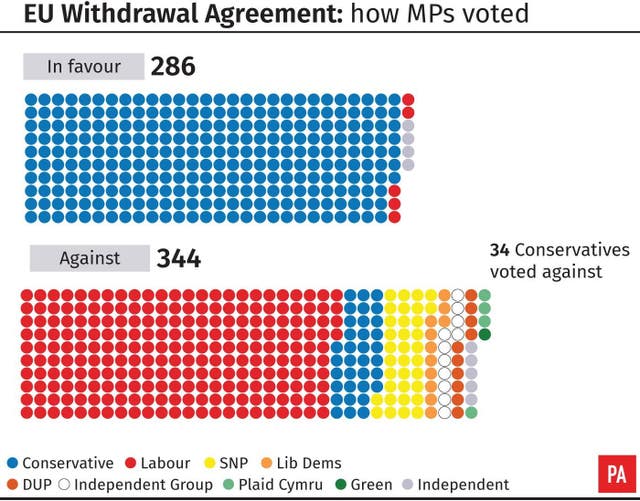Brexit set for long delay after MPs turn down Withdrawal Agreement
Theresa May said the UK would have to seek ‘an alternative way forward’ after her deal was defeated by 58 votes

Brexit appears to be on course for a lengthy delay after MPs rejected Theresa May’s EU Withdrawal Agreement by a margin of 58 votes.
In dramatic scenes in the House of Commons, MPs voted by 344 to 286 against the deal as hundreds of protesters staged a noisy demonstration outside on the day when the UK was due to leave the European Union.
Some 34 Conservative rebels ignored a last-ditch plea from the Prime Minister to take “the last opportunity to guarantee Brexit” and consigned her deal to its third humiliating defeat.
The result of the crunch vote means that the UK has missed an EU deadline to secure an extension of the Brexit process and leave with a deal on May 22.
Mrs May now has until April 12 to go back to Brussels with new proposals and seek a longer extension to the negotiation process, or see the UK leave without a deal that day.
With a clear majority in the Commons against no-deal, and with MPs once more seizing control of the timetable on Monday, Mrs May said the UK would have to find “an alternative way forward”.
This was “almost certain” to involve the UK having to stage elections to the European Parliament in May, she said.
Mrs May said that the outcome was “a matter of profound regret”.
Despite the setback, Downing St said it was not an “inevitability” that the UK would have to participate in the European elections and made clear she would continue to fight for her deal.
After defeats of 230 and 149 in the previous two Commons votes, a No 10 source said they were “at least going in the right direction”.
“We continue to believe that the deal the PM has negotiated is the best outcome for the country and we will continue to seek a way forward,” the source said.
European Council president Donald Tusk called an emergency summit of EU leaders in Brussels on April 10 to discuss the implications of the vote.
Labour leader Jeremy Corbyn called for a general election unless the Prime Minister was willing to find an alternative deal.
And Mrs May – who had promised to step down as Prime Minister if her deal was approved – appeared to hint that this was a possibility, telling MPs: “I fear we are reaching the limits of this process in this House.”

She said: “This House has rejected no deal. It has rejected no Brexit. On Wednesday it rejected all the variations of the deal on the table.
“And today it has rejected approving the Withdrawal Agreement alone and continuing a process on the future.
“This Government will continue to press the case for the orderly Brexit that the result of the referendum demands.”

Mr Corbyn told MPs: “The House has been clear this deal now has to change, there has to be an alternative found.
“And if the Prime Minister can’t accept that then she must go – not at an indeterminate date in the future but now, so that we can decide the future of this country through a general election.”
The deputy chairman of the European Research Group of Tory Eurosceptics, Steve Baker, called on Mrs May to step down immediately.
Declaring that this should be “the final defeat” for the PM’s deal – already rejected by 230 votes in January and 149 in March – Mr Baker said: “I regret to say it is time for Theresa May to follow through on her words and make way so that a new leader can deliver a Withdrawal Agreement which will be passed by Parliament.”

The fate of Mrs May’s deal was sealed as 34 Conservative MPs went through the No lobby, while only five Labour MPs voted with the Prime Minister.
The number of Tory rebels was fewer than half the 75 who opposed the deal in the Meaningful Vote of March 12 but enough to overturn the result had they voted the other way.
Among rebels were hardline Brexiteers including Mr Baker, Sir Bill Cash, Priti Patel, Owen Paterson and Sir John Redwood, along with supporters of a softer deal like Dominic Grieve, Justine Greening and Sam Gyimah.

Labour MPs backing the deal were Kevin Barron, Rosie Cooper, Jim Fitzpatrick, Caroline Flint and John Mann, along with the party’s former MPs Frank Field and Ian Austin, now sitting as independents.
DUP Westminster leader Nigel Dodds said Mrs May had missed “numerous” opportunities to remedy the “deficiencies” in proposed backstop arrangements for the Irish border, which made the deal unacceptable to his party.
“Over the coming weeks and months, we will continue to play a central role to chart a route that respects the democratic desire to leave the European Union but that does so in a way that strengthens our United Kingdom,” said Mr Dodds.





